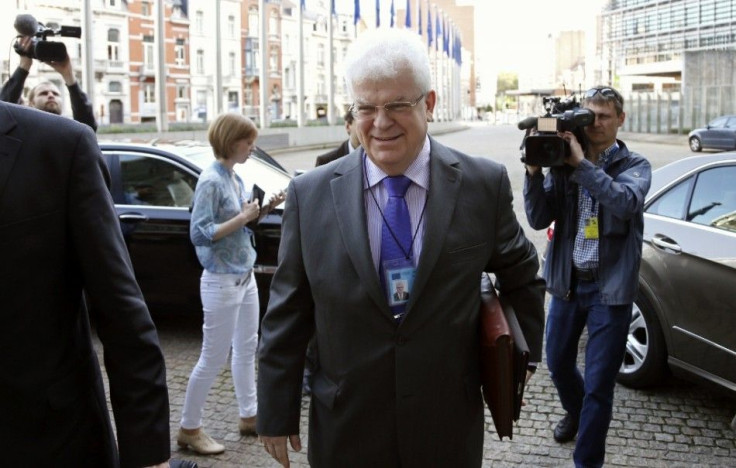Moscow Will Not Publish List of Banned Persons, Also to Ban Imports of European Animal Fat, Meat Byproducts, Fruits and Vegetables

Russia has come up with a list of persons banned from entering its turf, a report by News Agency TASS has revealed, citing Russia's Ambassador to the European Union Vladimir Chizhov. Thing is, it won't publish the said list.
In an interview with Rossiya 24 TV news channel, Chizhov said the list will not be made know publicly because it might exacerbate the tensions currently waging between Russia and Ukraine. Russia's incursions into Ukraine has earned a slew of economic sanctions from the European Union, to which the list of banned persons is believed to have been drawn up as retaliation.
Chizhov added that the list, believed to have been seen by other global authorities, isn't required to be circulated. "Neither the Russian legislation nor international commitments oblige us to publish it," he said, noting international practice doesn't really oblige that stop lists get formally published.
Saying "top leaders of countries" aren't part of the list, no one, however, he said, has been included in the list "by accident."
The growing unrest in Ukraine that started in March 2014 has pushed global federal governments to slap sanctions against Russian individuals and companies regarded as having direct involvement in destabilizing the situation. The U.S. banned the visas and froze the assets of seven Russian officials close to President Vladimir Putin in April. Sanctions were likewise imposed on 17 companies. All these on top of the March sanctions slapped against 31 individuals and a Russian bank. Canada likewise had its counterpart list.
As expected, Russian responded with its own sanctions, banning some Canadian and American individuals. The list included 11 U.S. officials and lawmakers. In May, the list was expanded but the Russian government resolved never to disclose who are on it.
Alexander Lukashevich, Russia's Foreign Ministry spokesman, said at that time that a "public show" of list of banned persons is not their cup of tea. He noted the sanctions were created because of the "unfriendly actions" hurled against Russia. "Sanctions are not our method in general." Asked how will people know they are already prohibited entering Russia, Lukashevich replied those people will know "when they apply for a visa."
Meantime, Russia has announced it will ban the imports of animal fat and meat byproduct from the European Union, as well as all fruit and vegetables from Ukraine. The bans took effect Monday and Wednesday, respectively.
Russia placed the ban on the fruits and vegetables because it believed Ukraine is being used by the European Union as vessel so their produce can be rerouted to enter the country. Russia said it had earlier asked Ukraine to properly label and detail in the information of the fruit and vegetables in a bid to stop EU produce from coming in. It alleged Ukraine failed to heed the request, thus the ban. Russia took particular note of the jump in the imports of apples, tomatoes, cucumbers, pears and plums from Ukraine in August and September after the ban was imposed. It said that compared to 2013, the import figures weren't that high. Russia is Ukraine's largest trading partner, with 80 percent of its fruit and vegetable exported there.
The ban on the imports of animal fat and meat byproduct from the European Union, on the other hand, will only be temporary. According to Reuters, the ban emanated from the discovery of "hazardous substances in such products." It is not known when the ban will be lifted.





















